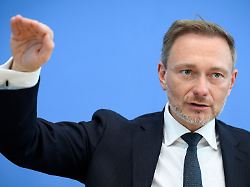Tax cuts announced
Lindner wants to put together a billion-dollar pact for companies
07/12/2023, 4:04 p.m
Finance Minister Lindner is now following the liberal prophecies of doom about the uncompetitive German economy. A draft tax package provides relief of six billion euros. Investment and risk should be encouraged, bureaucracy reduced.
Finance Minister Christian Lindner wants to relieve the economy by around six billion euros a year with a tax package. The Growth Opportunities Act is intended to strengthen Germany’s competitiveness and ensure more investment, according to the Ministry of Finance. Lindner therefore proposes almost 50 tax policy measures. The core element is the premium for investments in climate protection announced in the coalition agreement. Other proposals go beyond the SPD, Greens and FDP treaty. The draft has not yet been approved by the government.
Criticism came promptly from the Greens group. In the tense budget situation, six billion euros is a lot of money, said parliamentary group leader Andreas Audretsch. “On the one hand, making massive cuts and, on the other hand, distributing money with the watering can doesn’t go together.” The Ministry of Economic Affairs announced that it would examine the details closely.
Lindner’s main suggestions:
Investment bonus: Companies that improve their energy and resource efficiency as part of an energy saving concept are to receive 15 percent of the investment by 2027, regardless of their profit, but no more than 30 million euros. “There is a concrete incentive for companies to switch to climate neutrality more quickly,” said the Ministry of Finance.
Tax research funding: Previously, only personnel costs were eligible for research and development. This is to be extended to proportionate investment costs. In future, up to 70 percent of the order value should be eligible for funding.
Loss offset: With the loss carryback, a loss can be offset against the profits of the previous year. This reduces the tax burden for the previous year. This return is now to be extended to three years. The recently temporarily increased amount limit of ten million euros should apply permanently. From 2024 to 2027, restrictions on loss carryforwards are also to be lifted. This should increase the willingness to take entrepreneurial risks.
Bureaucratic hurdles: In addition to the larger tax breaks, Lindner wants to remove various bureaucratic hurdles. Reporting procedures and bookkeeping obligations are to be simplified and data are to be transmitted electronically instead of on paper. Lindner gets approval from his green coalition partner, especially for the climate protection investment premium.
“The Finance Minister’s proposals are a delicate start to what we need: a real stimulus for growth, prosperity and the competitiveness of Germany as a business location is needed,” said Economics Minister Robert Habeck. Audretsch, on the other hand, criticized “flat-rate tax breaks without a goal” and referred to the strained budgetary situation. Left boss Janine Wissler emphasized: “Lindner is worth around six billion euros for these tax gifts to corporations – but Lindner is too expensive for twelve billion to combat child poverty.”
Business, on the other hand, praised the project. “The package of laws addresses important issues for improving the tax framework for companies in Germany,” explained the general manager of the Federation of German Industries (BDI), Tanja Gönner. “The BDI is counting on the federal government taking up this initiative and implementing it quickly.”
Lindner does “nails with heads”, also judged the chief economist of the mechanical engineering association VDMA, Ralph Wiechers. “Here, simple, unbureaucratic and fair help is provided across the board and medium-sized companies are not left alone with their risks.”
